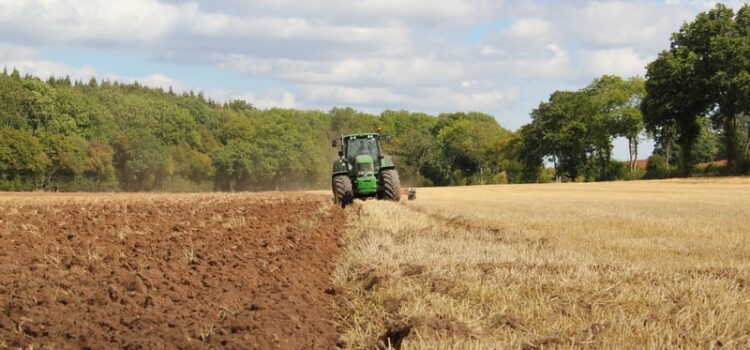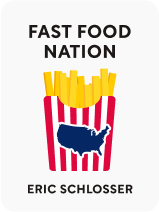

This article is an excerpt from the Shortform book guide to "Fast Food Nation" by Eric Schlosser. Shortform has the world's best summaries and analyses of books you should be reading.
Like this article? Sign up for a free trial here .
How has American agriculture changed in the last century? What is the effect of industrial farming on U.S. farmers, and what does fast food have to do with it?
American agriculture has changed drastically since the invention of fast food. The industry has exercised incredible influence on agriculture and agribusiness, mostly to the detriment of the country and to animals.
Read more about American agriculture and the fast food industry below.
American Agriculture and the Fast Food Industry
The needs of the fast food industry have caused permanent changes in American agriculture. This has had effects on individual farmers as well as the economy as a whole.
Effects on US Farmers
Fast food’s popularization of the french fry has radically reshaped US agriculture. As of the publication of Fast Food Nation, three major producers controlled 80 percent of the frozen french fry market. With this purchasing power, they wield enormous leverage over the nation’s potato farmers and strive to keep prices for them as low as possible. In economics, this situation is known as an oligopoly. This is when a handful of powerful buyers have enough market share to dictate prices to suppliers more or less at will. The farmers have benefited little from the nation’s demand for frozen fries since the 1950s: of every $1.50 spent on an order of fries, perhaps two cents accrue to the actual farmer (a little over 1 percent).
The only way farmers can compete under these economic conditions is to grow enough potatoes to make up in volume what they have lost in value. If you’re getting barely one cent on the dollar for the potatoes you grow, you need to grow a lot of potatoes to make your farm even remotely profitable. But that’s not easy either—growing more potatoes means more capital expenses in land and equipment. Farmers increasingly stretch themselves thin and take on debt to acquire new land, with no guarantee that they will be successful. Indeed, their fortunes are increasingly tied to world economic forces far beyond their control. Many formerly small, independent farmers simply don’t make it. They end up selling their land to major agribusiness concerns, who then bring them back as hired hands to work the land they once owned.
Manufactured Taste
It’s not an accident that a meal purchased at one Taco Bell tastes exactly the same as one purchased at another. As we’ve seen, fast food strives to deliver a uniform product to customers that’s the same everywhere in the world, which affects how American agriculture works.
They achieve this remarkable homogeneity of taste through the artificial food flavoring industry. This industry creates chemical compounds that create the scent and flavor of the foods we love, even if those ingredients are almost entirely absent from the processed food you’re consuming. They can make you taste blueberries without using a single blueberry.
Companies like International Flavors & Fragrances manufacture many of the tastes in the foods we consume every day, including those we experience at fast food restaurants. Everything from potato chips, breads, cakes, cookies, ice cream, teas, malt liquors, and toothpastes have their flavors tested and designed at industrial chemical facilities off the New Jersey Turnpike. The process involves the manipulation of chemicals to produce a desired smell (as most of what we taste actually comes from our sense of smell).
These companies are always innovating, using cutting-edge technology to improve the quality of the flavors they produce. They have even created synthetic mouths that provide detailed information on the textures of different food items. They are a key supplier to the major fast food chains and their additives appear in nearly all items sold there.
Notably, the Food and Drug Administration does not require flavor companies to disclose what’s in their additives, leading to euphemistic labeling on food packages like “artificial flavor.”
The Struggles of American Ranchers
Much like potato farmers, cattle ranchers have seen their livelihoods and their way of life irrevocably changed by the fast food industry. Family cattle ranches have given way to corporate-owned factory farms; meanwhile, the rugged, independent rancher of American folklore has become a dying breed. From 1980 to 2000, roughly 500,000 of them quit the business entirely.
The demands of fast food have encouraged consolidation in the meatpacking industry, as it has across nearly all agricultural commodities. This has created vastly disproportionate power imbalances in the market—with major meatpackers holding all of it and independent cattle-raisers having virtually no leverage at all. With only a few major meatpacking giants to whom they can sell their cattle, ranchers have little recourse when they’re faced with falling prices.
American Agriculture is an Unfree Market
Ranchers had faced similar oligopolistic conditions in the late 19th and early 20th centuries, but they were able to fight back against the major meatpackers thanks to legislative and regulatory reforms passed during the Progressive and New Deal Eras. Indeed, for much of the middle of the 20th century, ranchers were able to sell in reasonably competitive markets with far less concentration than today.
But this all changed in the 1980s, when the Republican administration of Ronald Reagan began taking a hands-off approach to antitrust and anti-competitive enforcement in the meatpacking industry. A wave of mergers and consolidations followed, such that the top four meatpackers controlled a whopping 84 percent of the market by the beginning of the 21st century.
Naturally, this has led to downward pressure on the prices that independent ranchers can expect to get for their cattle. The major companies are able to set prices more or less at will through their ownership of “captive supplies” of cattle. These are animals that are held in reserve in company-owned pens and feedlots. When the companies conclude that the prices ranchers are demanding for cattle are too high, they simply release their captive supplies of cattle and flood the market, pushing prices back down.
The major meatpackers also use secrecy and anti-competitive practices to put ranchers at a disadvantage. Specifically, they acquire cattle from large and wealthy ranchers through secret contacts, in which neither party discloses the amount that was actually paid. This makes it nearly impossible for independent ranchers to know what their products are actually worth, since they have no basis of comparison from comparable trades. The secrecy puts the ranchers in the position of being forced to accept the prices offered by the meatpackers, with little leverage to negotiate.
Collusion
The big meatpackers have acted in concert with one another to further gouge the independent ranchers, with some cases reaching the levels of blatantly illegal collusion in American agriculture.
(Shortform note: Collusion is when firms that are supposed to be in competition with one another team up in order to raise prices or shut out potential rivals. This is often done through price-fixing schemes, wherein the major players in a market will all agree to raise their prices at the same time—raising all of their profits while leaving the customer with no choice but to pay exorbitant costs. This is illegal under federal trade law.)
This was standard practice at Archer Daniels Midland, one of the meatpacking giants. In 1999, three of their executives were sent to federal prison after being caught conspiring with international rivals to corner the market on a specific additive to cattle feed. Through this scheme, the company had illegally overcharged ranchers to the tune of $180 million.

———End of Preview———
Like what you just read? Read the rest of the world's best book summary and analysis of Eric Schlosser's "Fast Food Nation" at Shortform .
Here's what you'll find in our full Fast Food Nation summary :
- How the fast food industry reshaped the American economy
- How fast food marketing is manipulating you
- Why the rise of fast food has destroyed family farms across America






